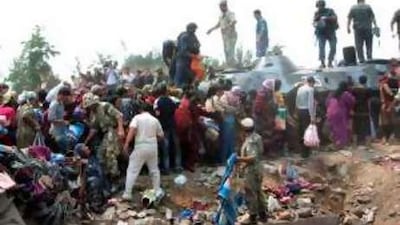MOSCOW // Kyrgyzstan's interim president yesterday appealed to Russia to send peacekeepers to the Central Asian nation after ethnic riots erupted in the country's tumultuous south leaving scores dead. Roza Otunbayeva, who assumed the Kyrgyz presidency following a coup in April, conceded that her government was unable to restore order in the southern city of Osh, where a brawl between ethnic Kyrgyz and Uzbeks on Thursday sparked two days of violence that left at least 77 people dead and more than 1,000 injured.
The government of Vladimir Putin, the Russian prime minister, said in a statement yesterday that the Russian premier held a telephone conversation with Ms Otunbayeva but gave no further details. "We need outside forces to be deployed to Kyrgyzstan to co-ordinate the situation and stamp out the conflict," Ms Otunbayeva told reporters in Bishkek, the local news agency reported. "The events have shown that a dialogue is impossible, and the shooting and pogroms are continuing. We are waiting for news from Russia and hope that in the nearest time the appropriate measures will be taken."
A spokeswoman for Dmitry Medvedev, the Russian president, said Moscow was rushing humanitarian aid to the region but was not prepared to send troops under the current circumstances. Russian television showed footage of gangs of Kyrgyz men armed with metal bars and weapons roaming through the city amid burnt-out cars and smoldering buildings. Ms Otunbayeva announced yesterday that she would open the border with Uzbekistan to allow Uzbek women, children and elders to seek refuge in the neighbouring republic. The intermin government yesterday also authorised the military and police to use deadly force against rioters.
The Associated Press reported that thousands of terrified ethnic Uzbeks were fleeing towards the Uzbek border, and that one of its reporters who visited the border saw bodies of children killed in the stampede of people fleeing in panic. Reached by telephone in Osh, Andrea Berg, a researcher for Human Rights Watch, said the situation was stabilising by the early evening yesterday. "There is less shooting, and the sky is visible again," Ms Berg said. "At around noon the sky was black with smoke. It looked like midnight. It was raining ash from all of the burning houses around." Helicopters were cruising above the city, and friends she spoke to in Uzbek neighbourhoods called "mahallas" said they had managed to defend their areas, Ms Berg said. The atmosphere remained ominous, she added. "The calm is also kind of scary," she said. The turmoil is the most serious test of Ms Otunbayeva's government since it ousted the previous Kyrgyz president, Kurmanbek Bakiyev, who fled the country in April following an uprising that left more than 80 people dead in several days of violence. "The situation is out of control," said Paul Quinn-Judge, Central Asia director for International Conflict Group, based in the Kyrgyz capital, Bishkek. "The question is whether the regime can restore control. There's no immediate sign that they have the resources to do so. We will see in the next few days whether they are able to stop the rot in the south." The unrest is complicated by the myriad destabilising factors in the area, Mr Quinn-Judge said, speaking by telephone yesterday. "In a situation of political uncertainty, there are all sorts of people making power plays," including local political, ethnic and criminal groups, Mr Quinn-Judge said. The situation is exacerbated by phenomena like opportunistic looting, he added. Kyrgyzstan is home to both a Russian military base, Kant, and a US base, Manas, which is a key transit point for US-led coalition forces being deployed to Afghanistan. A senior Russian military source told the state-run Itar-Tass news agency yesterday that Russian troops based at the Kant base would not be deployed as peacekeepers to stem the violence in Osh. The region was the site of ethnic clashes between Kyrgyz and Uzbeks in the summer of 1990 that left hundreds dead before intervention by the Soviet military. The current violence has clear parallels with the turmoil in the dying days of the Soviet Union, said Alexei Vlasov, an expert on post-Soviet affairs with Moscow State University. "As soon as centralised authority loses control, whether it's Soviet authorities or Kyrgyz authorities, Osh explodes like a wildfire," Mr Vlasov said. The Kremlin wants order restored in the area, but "there will be very serious discussions in the [Russian] security council and among top officials about the wisdom of putting peacekeepers in southern Kyrgyzstan", Mr Vlasov said. cschreck@thenational.ae

